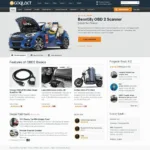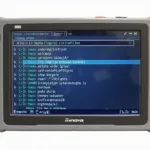The dreaded check engine light can be a source of anxiety for any car owner, especially when it’s accompanied by the cryptic code “P0440.” For Chevrolet drivers, this code often points to an issue within the Evaporative Emission Control (EVAP) system. But what exactly does that mean, and how serious could it be? This comprehensive guide delves into the intricacies of the OBD2 code P0440 in Chevy vehicles, providing you with the knowledge to understand the problem and take the right course of action.
Understanding the EVAP System and Code P0440
Before we delve into the specifics of the P0440 code, let’s first understand the role of the EVAP system. This ingenious system is designed to prevent harmful fuel vapors from escaping into the atmosphere. It captures these vapors from the fuel tank and stores them in a charcoal canister, releasing them back into the engine to be burned during combustion. This not only reduces emissions but also improves fuel efficiency.
The P0440 code specifically indicates a “general leak” within this system. This means that somewhere along the line, fuel vapors are escaping, potentially disrupting the system’s efficiency and increasing your vehicle’s emissions.
Common Causes of P0440 in Chevy Vehicles
While a “general leak” might sound vague, several common culprits often trigger the P0440 code in Chevy vehicles.
-
Loose or Damaged Gas Cap: This seemingly insignificant component plays a crucial role in sealing the fuel tank. A loose, cracked, or damaged gas cap is often the easiest and least expensive fix for the P0440 code.
-
Faulty Purge or Vent Solenoid: These solenoids act as gates, controlling the flow of fuel vapors within the EVAP system. A malfunctioning solenoid can disrupt this flow, triggering the P0440 code.
-
Cracked or Damaged EVAP Lines: The EVAP system relies on a network of hoses and lines to transport fuel vapors. Over time, these lines can become brittle, cracked, or disconnected, leading to leaks.
-
Faulty Charcoal Canister: The charcoal canister acts as a temporary storage unit for fuel vapors. If the canister itself or the purge valve connected to it fails, it can lead to a leak and trigger the code.
Diagnosing and Fixing the P0440 Code
While the P0440 code points to a problem within the EVAP system, pinpointing the exact cause requires a systematic diagnostic approach.
-
Visual Inspection: Begin by visually inspecting the gas cap, ensuring it’s tightly sealed. Next, examine the EVAP lines under the hood and near the fuel tank for any signs of damage, cracks, or disconnections.
-
Check for Stored Codes: Using an OBD2 scanner, check for any other stored codes alongside the P0440. These additional codes can provide valuable clues about the root cause of the problem.
-
Smoke Test: A smoke test is a highly effective method for detecting EVAP leaks. This involves introducing harmless smoke into the EVAP system, allowing mechanics to visually identify any points where smoke escapes, indicating a leak.
-
Component Testing: If the visual inspection and smoke test don’t reveal the culprit, further testing of individual components like the purge and vent solenoids, charcoal canister, and pressure sensor may be necessary.
Why Addressing P0440 is Crucial
While a P0440 code might seem like a minor inconvenience, ignoring it can have more significant implications:
-
Increased Emissions: A leaking EVAP system releases harmful fuel vapors into the atmosphere, contributing to air pollution.
-
Reduced Fuel Efficiency: A malfunctioning EVAP system can disrupt the optimal air-fuel mixture in the engine, potentially reducing fuel economy.
-
Further Engine Damage: In some cases, a neglected EVAP leak can lead to more severe engine problems down the line, resulting in costly repairs.
“Addressing EVAP issues promptly not only ensures your vehicle’s environmental responsibility but also saves you from potential headaches and expensive repairs in the long run,” says John Smith, Senior Automotive Technician at ABC Auto Repair. “Don’t underestimate the importance of a properly functioning EVAP system.”
Conclusion
The OBD2 code P0440 in your Chevy vehicle signals a potential leak within the EVAP system. While the causes can range from a simple loose gas cap to more complex issues with solenoids or the charcoal canister, addressing this code promptly is crucial for maintaining your vehicle’s performance, fuel efficiency, and environmental responsibility. By understanding the EVAP system and the potential causes of the P0440 code, you can take the necessary steps to diagnose and resolve the issue, ensuring your Chevy continues to run smoothly and cleanly.
FAQs
Q: Can I still drive my car with a P0440 code?
A: While you may be able to drive for a short period, it’s crucial to address the P0440 code as soon as possible to prevent further damage and ensure your vehicle’s emissions are within legal limits.
Q: How much does it cost to fix a P0440 code?
A: The cost of repair varies widely depending on the underlying cause. A simple gas cap replacement could cost under $20, while replacing a charcoal canister could cost several hundred dollars.
Q: Can I fix the P0440 code myself?
A: If you’re mechanically inclined, you might be able to handle simple fixes like replacing the gas cap or inspecting EVAP lines. However, for more complex issues, it’s best to seek professional help.
Q: How often should the EVAP system be checked?
A: It’s generally recommended to have your vehicle’s EVAP system inspected every 30,000 miles or as part of your regular maintenance schedule.
Q: Can extreme temperatures affect the EVAP system?
A: Yes, extreme temperatures, both hot and cold, can impact the EVAP system’s components, potentially leading to leaks or malfunctions.
For more information about specific OBD2 codes for your Chevy model, check out our comprehensive guides:
- 2002 astro rwd obd2 codes
- 2002 chevy silverado obd2 codes
- 2001 chevy impala obd2 codes
- 03 chevy cavalier obd2 codes
- obd2 impala
If you’re experiencing persistent car troubles or need expert assistance with your vehicle’s diagnostics, don’t hesitate to reach out. Contact our team of automotive specialists via WhatsApp at +1(641)206-8880 or email us at [email protected]. We’re available 24/7 to provide the support you need.

